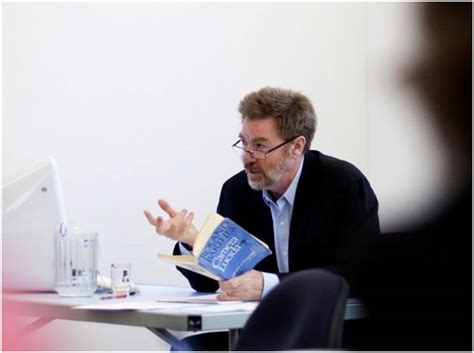A Quote by Ezra Pound
Objectivity and again objectivity, and expression: no hindside-before-ness, no straddled adjectives (as "addled mosses dank"), no Tennysonianness of speech; nothing-nothing that you couldn't, in some circumstance, in the stress of some emotion, actually say.
Quote Topics
Related Quotes
It should be totally fine to question the objectivity of scientists and the power structures in scientific institutions. The physical laws of the universe are objective, but human beings in any context are not. That includes with regard to science. To some extent, the supposed objectivity of science has given a lot of extra cover to very subjective and eccentric approaches to exploring aspects of ourselves and the universe around us.
The main difference seems to be that, whereas photography still claims some sort of objectivity, digital imaging is an overtly fictional process. As a practice that is known to be capable of nothing but fabrication, digitization abandons even the rhetoric of truth that has been such an important part of photography's cultural success.
When, in the year 1913, in my desperate attempt to free art from the ballast of objectivity, I took refuge in the square form and exhibited a picture which consisted of nothing more than a black square on a white field, the critics and, along with them, the public sighed: 'Everything which we loved is lost. We are in a desert .... Before us is nothing but a black square on a white background!'
If you're deeply engaged in an event, you're part of it. But if you're outside of it, disinterested, you are the regard that registers history. And that disinterestedness is different from objectivity. The objective view sees only the event, while the disinterested one participates as well as views by creating that link to history. It's a type of viewing that's both inside and out of the event, that brings to the viewing the capacity for human emotion, for compassion, but holds it openly. And objectivity excludes the human element, and is therefore not a point of view open to humans.
Many journalists become very defensive when you suggest to them that they are anything but impartial and objective. The problem with those words "impartiality" and "objectivity" is that they have lost their dictionary meaning. They've been taken over. "Impartiality" and "objectivity" now mean the establishment point of view.
As Confucius once said, 'He who does nothing is the one who does nothing.'" Gabby pondered the words, the furrowed her brow. "did Confucius really say that?" Sunglasses in place, Stephanie managed the tiniest of shrugs. "No, but who cared? The point is, they handled, and most likely they found some sort of self-satisfaction in their industrious-ness. Who am I to deprive them of that?







































